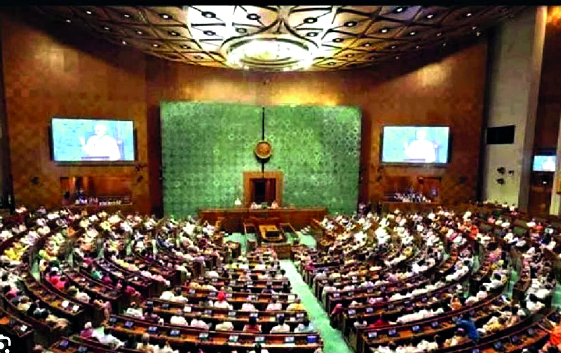Delay in reconstituting key Parl committees sparks concerns

New Delhi: As the new coalition government led by Prime Minister Narendra Modi completes over 100 days in office, the reconstitution of several key parliamentary committees remains an outstanding task.
These committees are critical to India’s legislative framework, providing essential inputs for governance and law-making. Despite growing concerns, Lok Sabha Speaker Om Birla has remained silent when questioned by the media about the delay.
There is speculation within political circles that the ruling National Democratic Alliance (NDA) intends to retain control over pivotal parliamentary panels, including those on home affairs, finance, defence, and external affairs. This strategy is seen as a way to ensure policy continuity and facilitate the swift implementation of reforms.
However, the opposition, which has gained more seats in the 18th Lok Sabha, is expected to chair a greater number of committees than in the previous Lok Sabha. It is anticipated that the Congress party, as the principal opposition force, may chair four department-related standing committees.
The DMK and Trinamool Congress (TMC) are each expected to chair one panel in both the Lok Sabha and Rajya Sabha. The Samajwadi Party, with 37 seats in the Lok Sabha, has expressed interest in a Rajya Sabha committee, likely securing the education panel, with Ram Gopal Yadav as its head.
Amid concerns of delay, Parliamentary Affairs Minister Kiren Rijiju has reassured that there is no unusual hold-up in the formation of the standing committees. According to Rijiju, the committees are traditionally constituted by the end of September, and this timeline is consistent with past conventions. His defence comes in response to growing criticism from some Members of Parliament, who claim that the delay could hinder the legislative process.
In a democratic framework like India’s, the legislature plays an essential role in holding the government accountable. The Parliament, as the apex legislative body, not only creates laws but also monitors the government’s functioning.
Standing committees are among the most effective mechanisms Parliament employs to scrutinise governance. These department-related standing committees are tasked with examining the operations of various Union ministries, scrutinising budget allocations, and analysing Bills tabled in Parliament. Their reports and recommendations are invaluable for shaping legislative and policy initiatives.
As the NDA reconstitutes these panels, it is expected that significant representation will be given to its allies, including key parties like the Telugu Desam Party (TDP) and Janata Dal (United).
These alliances are crucial to the NDA’s majority in Parliament, and the chairmanship of select committees is likely to reflect this strategic partnership.
Parliamentary committees, particularly department-related standing committees, are reconstituted annually. However, changes in membership for several other committees, such as joint parliamentary committees, occur as needed when members retire or lose their seats. These panels are designed to reflect the proportional representation of all political parties in Parliament, ensuring a broad-based participation in the legislative process.
India’s standing committees span a wide range of governance areas, covering all Union ministries and departments.
Each department-related standing committee consists of 31 members, with 21 drawn from the Lok Sabha and 10 from the Rajya Sabha. These members are nominated by the Speaker of the Lok Sabha and the Chairman of the Rajya Sabha, respectively. In total, there are 24 such standing committees.
Beyond these, numerous other standing committees exist to oversee various parliamentary functions. For instance, the Business Advisory Committee, comprised of 15 members, advises on the allocation of time for debating government and legislative business. Similarly, the Committee of Privileges investigates breaches of parliamentary privilege, while the Committee on Absence of Members monitors the attendance of MPs.
Specialised committees, such as the Committee on Empowerment of Women, address targeted issues, ensuring that women’s welfare programmes are scrutinised. Meanwhile, the Committee on Government Assurances tracks promises made by ministers and the extent to which these assurances are fulfilled. Other vital panels, such as the Committee on Papers Laid on the Table, ensure that documents presented to Parliament meet constitutional requirements, while the Committee on Private Members’ Bills and Resolutions allocates time for discussing these non-government Bills.
Another significant body, the Committee on Subordinate Legislation, reviews the delegation of legislative powers, ensuring that rules and regulations made under Acts of Parliament adhere to legislative intent.
Committees like the General Purposes Committee advise the Speaker on managing House matters, and the Committee on Welfare of Scheduled Castes and Scheduled Tribes evaluates welfare programmes for these communities, monitoring their representation in public services.
In addition to these standing committees, several joint parliamentary committees (JPCs) play critical roles in overseeing specific sectors.
The JPC on Salaries and Allowances of MPs determines allowances and other benefits for parliamentarians, while the Committee on Ethics examines the moral conduct of members.
The Joint Parliamentary Committee on Security in Parliament House Complex reviews security measures, and the JPC on the Maintenance of the Heritage Character and Development of Parliament House Complex ensures that the building’s architectural and historical integrity is preserved.
Finally, the Joint Parliamentary Committee on the Allocation and Pricing of Telecom Licences and Spectrum has a significant role in scrutinising policies around the allocation of telecom licenses and spectrum, ensuring that decisions between 1998 and 2009 followed legal procedures.
Together, these committees form the bedrock of India’s legislative oversight, ensuring accountability, transparency, and the effective functioning of government.
While delayed, the reconstitution of these bodies will be essential for the NDA government’s ability to navigate its legislative agenda in this term.



